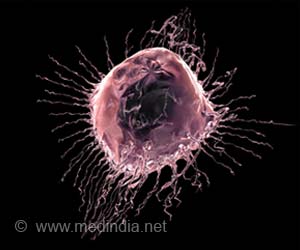A new study has now raised the possibility of an association between aluminum salts contained in deodorants and increased risk of breast cancer.
A new study has now raised the possibility of an association between aluminum salts contained in deodorants and increased risk of breast cancer. Salts of metals like cadmium and aluminum are believed to exert estrogen-like efforts on breast cancer cells, leading to malignant transformation.
Under laboratory conditions, these salts have even been found to accelerate the growth of breast cancer cell lines, highlighting the carcinogenic potential of such compounds, used in everyday life.In addition to antiperspirants, detergents, cosmetics, pesticides and inorganic estrogen related compounds, strongly mimic the female sex hormone, estrogen. These class of compounds referred to as metalloestrogens can significantly affect the signal transduction mechanism of the cells in the breast, eventually leading to breast cancer.
Of late, there has been an increased attention regarding human breast exposure to a diverse range of estrogenic compounds that can induce cancer. Furthermore, deodorants are applied in close proximity to the breast, over the skin surface. It is also used soon after shaving that enables easy entry into the blood.
Any break or discontinuity in the skin surface can cause increased penetration of the aluminum salts into the skin present over the underarm. Until now, only organic chemicals (compounds that contain carbon and hydrogen) have been believed to modify the normal functioning of the hormone, estrogen or exert estrogen-like effects in the body.
In view of the above possibility, more research is clearly indicated to accurately assess the effect of such inorganic compounds. The overall collective effect of these chemicals should also be taken into consideration. Exposure to cadmium salts can be minimized through quitting smoking.
The researchers further recommended minimal application of deodorants around the breasts and under the arms. As an alternative, washing with soap and water, twice a day can cut down the associated cancer risk.
Advertisement











